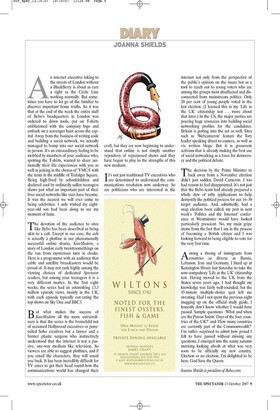DIARY
JOANNA SHIELDS An internet executive taking to the streets of London without a BlackBerry is about as rare a sight as the Circle Line working normally. But sometimes you have to let go of the familiar to discover important home truths. So it was that at the end of the week the entire staff of Bebo's headquarters in London was ordered to down tools, put on T-shirts emblazoned with the company logo and embark on a scavenger hunt across the capital. Away from the business of writing code and building a social network, we actually managed to bump into our social network in person. It's an extraordinary feeling to be mobbed by members of your audience who, spotting the T-shirts, wanted to share animatedly their life experiences with you as well as joining in the chorus of 'YMCA with the team in the middle of Trafalgar Square. Being high-fived by schoolchildren and declared cool by ordinarily sullen teenagers shows just what an important part of their lives social networks like ours have become. It was the nearest we will ever come to being celebrities. I only wished my eightyear-old son had been along to see my moment of fame.
The devotion of the audience to sites like Bebo has been described as being akin to a cult. Except in our case, the cult is actually a plotline in our phenomenally successful online drama, KateModem, a story of London early twentysomethings on the run from mysterious men in cloaks. Here is a programme with an audience that cable and satellite broadcasters would be proud of. It may not rank highly among the viewing choices of dedicated Spectator readers, but among your teenagers it is a very different matter. In the first eight weeks, the series had an astonishing 13.3 million episode views, mainly in the UK, with each episode typically out-rating the top shows on Sky One and BBC3.
But what makes the success of KateModem all the more extraordinary is that the series is the brainchild not of seasoned Hollywood executives or ponytailed Soho creatives but a lawyer and a former plastic surgeon who instinctively understood that the internet is not a passive, one-way medium like television. So viewers are able to suggest plotlines, and if you email the characters, they will email you back. It has been incredibly difficult for TV execs to get their head round how the communications world has changed their craft, but they are now beginning to understand that online is not simply another repository of repurposed shows and they have begun to play to the strengths of this new medium.
It's not just traditional TV executives who are determined to understand the communications revolution now underway. So are politicians who are interested in the internet not only from the perspective of the public's opinion on the issues but as a tool to reach out to young voters who are among the groups most disaffected and disconnected from mainstream politics. Only 20 per cent of young people voted in the last election. (I learned this in my 'Life in the UK' citizenship test . . . more about that later.) In the US, the major parties are pouring huge resources into building social networking profiles for the candidates. Britain is getting into the act as well. Sites such as Webcameron' feature the Tory leader speaking direct to camera, as well as via written blogs. But it is grassroots activism that is already making the best use of social networking as a force for democracy and the political debate.
The decision by the Prime Minister to back away from a November election didn't just sadden David Cameron. I too had reason to feel disappointed. It's not just that the Bebo team had already prepared a whole slew of nifty applications to help demystify the political process for our 16-30 target audience. And, admittedly, had a snap election been called, my part in next week's 'Politics and the Internet' conference at Westminster would have looked particularly prescient. No, my main gripe stems from the fact that I am in the process of becoming a British citizen and I was looking forward to being eligible to vote for the very first time.
Among a throng of immigrants from countries as diverse as Russia, Lebanon, Iran and Germany, I lined up at Kensington library last Saturday to take the now-compulsory 'Life in the UK' citizenship test. Having moved to the UK from the States seven years ago, I had thought my knowledge was fairly well-rounded, but the 45-minute multiple-choice quiz left me sweating. Had I not spent the previous night mugging up on the official study guide, I honestly don't know whether I would have passed. Sample questions: 'What and when are the Patron Saints' Days of the four countries of the UK?' and 'How many countries are currently part of the Commonwealth?' I'm rather surprised to admit how proud I felt to have passed without missing any questions. I emerged into the sunny autumn morning looking afresh at what was very soon to be officially my new country. Election or no election, I'm delighted to be here. God Save the Queen.



































































 Previous page
Previous page